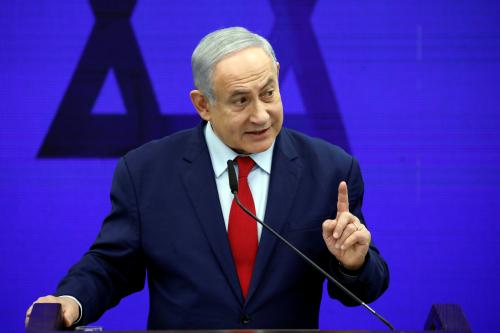Also check out a timeline spelling out recent and likely upcoming events in Israeli politics.
On Monday, Israeli Prime Minister Benjamin Netanyahu told President Reuven Rivlin that he was unable to form a governing coalition, officially returning the mandate to do so. As a result, on Wednesday Rivlin gave Blue and White party leader Benny Gantz a chance to try to form a govermnent. Below, we address some of the questions facing Israeli politics in this time of uncertainty and ongoing deadlock.
Is this failure the end for Netanyahu?
No. Netanyahu could still form the next government even within this Knesset. Benny Gantz now has 28 days to try and form a governing coalition. If (and perhaps when) his November 20 deadline passes without a new government in place, a period of 21 days will follow in which any member of Knesset can form a government. Netanyahu is waiting for those 21 days, which would end on December 11.
While Netanyahu failed to form a government, his effort during the initial phase seemed half-hearted at most. For all intents and purposes, he seemed quite satisfied to run out the clock on the 28 days he was given to build a governing coalition, in anticipation that he may have another chance.
Why didn’t Netanyahu return the mandate earlier?
Netanyahu has a different clock now ticking, one that is potentially more important for him than government formation, due to his possible looming indictment on criminal charges. He would seem to benefit most from facing an indictment decision from the strongest possible position, as prime minister. This theory assumes — rightly or wrongly — that Attorney General Avichai Mandelblit would be more hesitant to indict Netanyahu with a serious crime while he remains prime minister given the historical weight of such a decision.
Netanyahu, judging his chances to form a government to be very low given that Yisrael Beiteinu leader Avigdor Lieberman continues to stand in his way, seems to have chosen to run out his allotted time rather than return the mandate earlier. Instead of rushing a government formation process that could favor another candidate and leave him to face his legal challenges outside the office of prime minister, Netanyahu opted to bide his time.
What is the status of his legal proceedings?
The hearings with the attorney general have been concluded. An indictment decision is expected by mid-December at the latest, before State Prosecutor Shai Nitzan — the attorney general’s number two and a central figure in this process — retires. An earlier indictment announcement is possible and would be extremely consequential for government formation.
Why is it proving so difficult to form a government?
As has been clear since the election results were released, if everyone in the political system holds true to their starting positions, there is no coalition to be formed. As one of us explains in more detail here, there’s a logjam facing Israeli politics: Netanyahu’s opposition refuses to join him in a coalition if he is indicted in criminal charges, his right-wing bloc refuses to join with the center-left in a coalition led by someone other than Netanyahu, the swing party of Avigdor Lieberman insists on a national unity government that includes both the right and the center-left, and Netanyahu refuses to step aside and allow his party to form or join a coalition without him, which would obviate the roadblock to a unity government.
How will Gantz and his Blue and White party try to break the deadlock?
The two most plausible of the unlikely routes out of this are: one of the party leaders breaks their word, or the Likud party rebels against Netanyahu.
Blue and White’s preferred outcome would be to entice Likud members to jettison Netanyahu, allowing Blue and White and the Likud to form a national unity government, perhaps including former Minister of Defense Avigdor Liberman and others. Blue and White would gladly overcome any policy differences with the Likud if it meant ousting Netanyahu.
Blue and White seem to be betting on an announcement soon by the attorney general that he’s decided to indict Netanyahu for bribery; this would give political cover to members of the Likud to break ranks. But, if the attorney general decides to drop the bribery charge, keeping only the less serious charges, then an indictment decision could achieve the reverse outcome, allowing Netanyahu greater breathing room in the Likud and ironically even a public relations victory.
It’s also possible that Blue and White, or at least Gantz, would like to form a coalition with the ultra-Orthodox parties, Lieberman’s Yisrael Beiteinu, and Labor.
The ultra-Orthodox parties have said that they would not, in theory, refuse to sit in government with Lieberman or Gantz’s partner in Blue and White, Yair Lapid. The latter is someone who they have previously said they would boycott, but they appear to have pulled back from that claim. Such a move might, however, prove risky for Lieberman, who forced this second round of elections by making a stand on behalf of the secular right. He would need concessions from the ultra-Orthodox in order to justify the about-face, politically. The ultra-Orthodox, on the other hand, would need to be enticed to break with Netanyahu, and to avoid a third election, which they may fear least of any of the parties, since their electorate tends to show up at the polls in high numbers.
Blue and White also hopes that the specter of a third election would give Likud members enough political cover to break with Netanyahu, or perhaps motivate others, even the ultra-Orthodox, to join with Blue and White in a governing coalition.
Are there any indications of a rebellion within Likud?
Not major ones, but there have been indications that Netanyahu is uncertain of his position.
First, Netanyahu’s constant demands to affirm his authority within the Likud (an authority that no one within the party has questioned) are causing a stir. When he floated the idea of snap primaries within the Likud, for instance, we saw the only other sign of a potential rebellion, as Gideon Sa’ar, former minister of the interior and currently the most visible challenger to Netanyahu, tweeted just two words: “I’m ready.” This was a clear allusion to the prospect of a primary, and was enough for Netanyahu to cancel the Likud primary and instead opt for an affirmation by the Likud’s institutions that he is indeed the party chairman, a fact that no one doubted.
Netanyahu likely does not fear that Sa’ar would beat him in a primary, but instead wants to avoid anything short of an overwhelming victory in such a contest. If Sa’ar or another candidate received 30% or 40% of the vote, that in itself would be a symbolic defeat for Netanyahu and could signal the beginning of his end.
There are frequent rumors of conversations among leaders of the Likud expressing their dissatisfaction with Netanyahu’s insistence that only he can lead the Likud, but they face a serious problem reminiscent of the one facing many Republican elected officials in the United States. The Likud base is loyal to Netanyahu, so its elected officials are wary of being seen to betray him. They would instead prefer to see him undone by other means, and then set themselves in position to succeed him.
Could Gantz form a government without any of the right-wing parties?
Maybe, but it would need to be a minority government – it is enough for a government to gain the confidence of the Knesset by a simple majority, meaning that with some abstentions, a minority government can be formed. This government would likely be unstable, and the Knesset may vote to dissolve itself at some point. But in the interim, some of the key political players would be happy to get Netanyahu out of the prime minister’s office and start a new political era in Israel.
Of course, a minority government would face difficulty passing legislation, especially a budget, which must be passed by early 2020 in order for a government to remain in office, but there are several months before that deadline comes into play for a new government.
Does anyone want a third election?
No, with the possible exception of Netanyahu himself, who would remain prime minister in the meantime. All others see the prospect of a third election as an approaching cliff, and what is currently taking place is a classic game of “chicken.” As the cliff gets closer, the pressure to find a way out of the present political deadlock will grow.
New elections are not likely, but may be the most likely of several low-likelihood outcomes in this process. If no one budges from their position, then there will be new elections. By and large, no one wants that outcome, but this doesn’t mean that anyone will bear the personal costs required to avoid them.
We don’t know which, if any, of the parties would stand to improve their positions in a third election, and neither do the candidates themselves. While many are now trying to game the system, no one is sure they will be able to. One of us wrote before the second election that there wasn’t precedent for understanding the effects on voter turnout of two elections in such quick succession. We doubly do not know what would happen to turnout in a third election.
What effect does this political deadlock have on policy?
Interim governments are limited in their ability to operate. If no government is formed and a third election follows, then Israel would begin 2020 without a new budget. Many more of the state apparatuses would then be in limbo.
The military is an especially notable case of this, as it is working on a significant, multi-year financing plan. This plan is especially important to the new Israel Defense Forces (IDF) Chief of Staff Aviv Kochavi, who is looking to make major changes to force structure and emphases in the military. But for this, he needs an approved budget, something he cannot get until a regular government is in place.
If a new budget can’t be passed, would the government shut down?
There is no trigger for a government shutdown in Israel. Instead, if 2020 begins and a budget has not been passed, government agencies would operate each month on 1/12th of their budget from the previous year. This allows for the continuity of systems, but prevents any long-term planning, and would not be a formula for healthy governance.
The Brookings Institution is committed to quality, independence, and impact.
We are supported by a diverse array of funders. In line with our values and policies, each Brookings publication represents the sole views of its author(s).








Commentary
Israel’s government formation: Answering the key questions
October 25, 2019